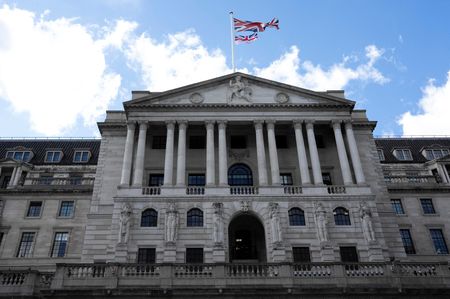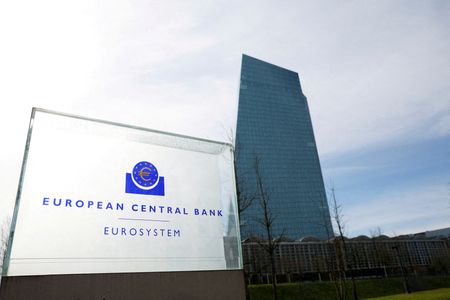By Lawrence White and Sam Tabahriti
LONDON (Reuters) -Britain’s central bank on Tuesday delayed implementing a key part of new, global rules governing banks’ trading activities by a year to 2028, as it waits for clarity on what other jurisdictions including the United States will do.
As part of a series of changes unveiled to help British lenders, the Bank of England also announced an easing of capital requirements for mid-sized banks, a change that had been expected.
The announcements follow calls from the Labour government for regulators to replace a risk-averse stance with one that supports financial sector growth. UK Finance Minister Rachel Reeves on Tuesday also announced a plan to rein in regulators and get more savers investing in shares to boost the financial services industry and the economy.
The BoE said it would stick with a January 2027 implementation date for most of the Basel 3.1 rules but that it would postpone part of the rules known as Fundamental Review of the Trading Book (FRTB) to 2028.
The FRTB governs capital and reporting requirements relating to banks’ trading assets, crucially including how risk should be measured using a standard method or banks’ own calculations.
The BoE said it had proposed delaying implementation of the internal models approach to give firms more time to prepare and given “continued uncertainty” over implementation elsewhere.
“Today’s announcements will give certainty to firms of all sizes about the future capital framework … and allow an extra year for part of the implementation of new investment banking rules,” Bank of England Deputy Governor Sam Woods said.
Supervisors globally have been delaying the full implementation of banking reforms known as Basel 3.1 to avoid burdening their own companies with extra rules before other countries have introduced them and to get a better understanding of what the United States would do under Donald Trump after the president pledged to deregulate.
The BoE said in January it was delaying the broader Basel rules by a year to January 2027, which prompted the European Union to say it would consider its options. A few months later the EU delayed implementation of its FRTB rules until 2027.
The initial batch of Basel III rules from the Basel Committee of banking regulators from the world’s main financial centres were rolled out in the aftermath of the global financial crisis, and the final batch, which the BoE calls Basel 3.1, were set be implemented from January 2025.
MID-SIZED BANKS
Separately, the BoE raised the minimum asset threshold at which banks must issue loss-absorbing debt known as MREL — designed to ensure banks can be “bailed in” rather than bailed out — to a range of 25 billion to 40 billion pounds ($53.73 billion), up from 15 billion to 25 billion pounds.
The new range is slightly more generous than the 20 billion to 30 billion pounds range proposed during a consultation last year.
Banks that have above 40 billion pounds in assets will be expected to prepare full bail-in plans, while those within the new band will be assessed on a case-by-case basis.
Mid-sized lenders such as OneSavings Bank and Metro Bank, long critical of the post-crisis rules as disproportionately punitive, are among those expected to benefit.
Shares in Metro rose 0.5% while OneSavings Bank stock gained 0.62%, slightly ahead of the broader market.
Paragon Banking Group Chief Executive Nigel Terrington welcomed the BoE’s increase to the MREL capital requirement threshold, describing it as a “strong step in harnessing the full potential of this sector.”
($1 = 0.7444 pounds)
(Writing by Sam Tabahriti; Additional reporting by Sachin Ravikumar; Editing by Tommy Reggiori Wilkes and Kim Coghill)










